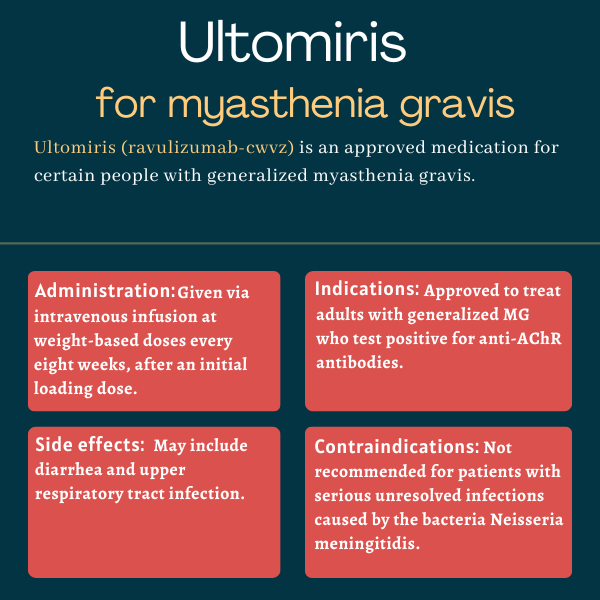FAQs about Ultomiris
The U.S. Food and Drug Administration approved Ultomiris in April 2022 for adults with generalized myasthenia gravis (gMG) who are positive for antibodies targeting the acetylcholine receptor. In addition to gMG, Ultomiris is approved in the U.S. for atypical hemolytic uremic syndrome, paroxysmal nocturnal hemoglobinuria, and neuromyelitis optica spectrum disorder.
Some generalized myasthenia gravis (gMG) patients may see results as early as one week after starting treatment with Ultomiris. The CHAMPION MG trial showed that, in adults with gMG who had never received a complement inhibitor, Ultomiris could rapidly improve scores on different measures of disease severity within one week. However, each patient is unique and may respond differently to a given treatment; thus, a discussion with their healthcare team can help gMG patients better understand how Ultomiris may help in their particular case.
Neither hair loss nor weight gain has been reported in clinical trials as side effects of Ultomiris treatment in patients with generalized myasthenia gravis. Patients are advised to speak with their healthcare provider if they experience any unusual symptoms while on the medication.
There are no clinical data on the use of Ultomiris in pregnant patients. However, a similar compound, an anti-C5 antibody, caused harm to the developing fetus in animal models. Patients who are pregnant or are planning to become pregnant should discuss this issue with their healthcare providers.
Ultomiris has been reported to have no effect or a negligible impact on a person’s ability to drive or use machines. Nevertheless, it’s recommended that patients be careful before attempting to drive or use any machines until they know how Ultomiris affects them. Patients prescribed Ultomiris should talk with their healthcare team about the treatment’s potential effects on activities such as driving.
Related Articles

 Fact-checked by
Fact-checked by 







